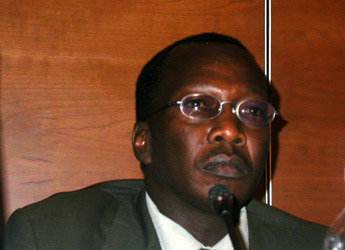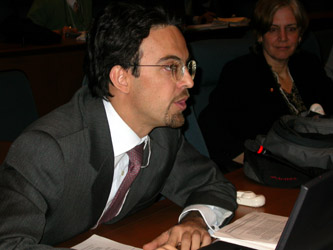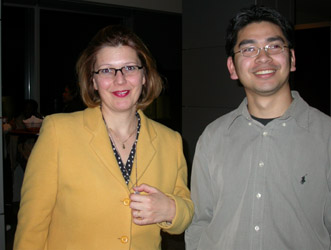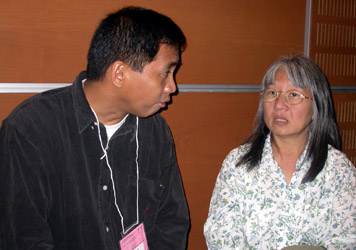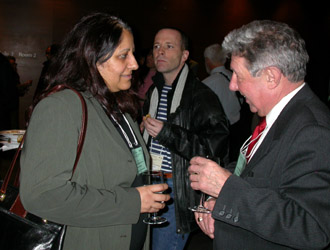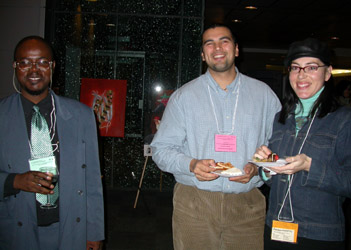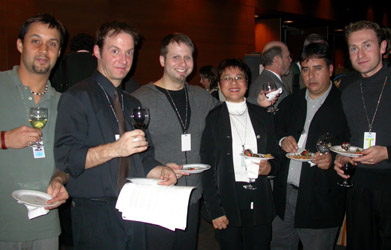ENB
web
coverage
and
daily reports
|
|
Day
|
HTML
|
PDF*
|
TXT
|
|
|
 |
 |
 |
|
|
 |
 |
 |
|
3
December |
 |
 |
 |
|
4
December |
 |
 |
 |
|
5
December |
 |
 |
 |
|
SUMMARY |
 |
 |
 |
|
|

|
|
 To
view PDF files, you will need the free Adobe Reader To
view PDF files, you will need the free Adobe Reader
|
 To
listen to Real Audio files, you will need the free
RealOne Player To
listen to Real Audio files, you will need the free
RealOne Player |
|
SECOND AD HOC OPEN-ENDED WORKING GROUP ON
ACCESS AND BENEFIT-SHARING
Montreal,
Canada; 1-5 December 2003
Highlights for
Monday, 1 December 2003
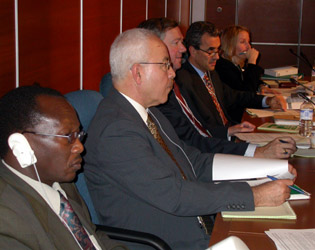
Delegates to the second meeting of the Ad Hoc Open-ended Working Group
on Access and Benefit-sharing (ABS) of the Convention on Biological
Diversity (CBD) met in a morning Plenary to hear opening statements and
reports on experience gained in using the Bonn Guidelines on ABS, and
address organizational matters. An afternoon Plenary heard views on an
international regime on ABS.
Above photo L-R: ABS opening plenary dais with Nehemiah
Rotich, UNEP, Hamdallah Zedan, CBD Executive Secretary, Hans
Hoogeveen, CBD
COP President, Olivier Jalbert, CBD Secretariat, and Valerie
Normand, CBD Secretariat.
|
|
|
|
| Plenary: Opening
Statements |
|
|
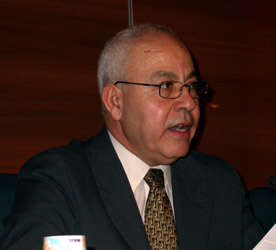
|
|

CBD
Executive Secretary Hamdallah Zedan noted that ABS was of
particular significance to developing countries and emphasized
links to related matters such as traditional knowledge, intellectual
property rights (IPRs) and trade.
|
|
|

|
|

CBD
COP President Hans Hoogeveen
(the Netherlands) opened the meeting,
stressing that the success of COP-7 would depend on the successful
outcome of this week's discussions, and called on delegates to
build upon commitments of the World Summit for Sustainable
Development.
|
|
|
|

Nehemiah
Rotich, on
behalf of UNEP Executive Secretary Klaus Töpfer, underlined the
importance of benefit-sharing for biodiversity conservation and
called for capacity building actions to support implementation of
adequate ABS systems.
|
|
|
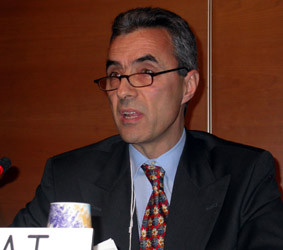
|
|

Olivier
Jalbert, CBD Secretariat, on behalf of the Food and Agriculture
Organization (FAO), stressed the key features of the
International Treaty on Plant Genetic Resources adopted in 2001,
and notes that it is expected to enter into force in the first
half of 2004.
|
|
|
|

Shakeel
Bhatti
(WIPO), introduced its technical study on disclosure
requirements related to genetic resources and traditional knowledge,
noting that it does not reflect WIPO's formal policy on
the issue.
|
|
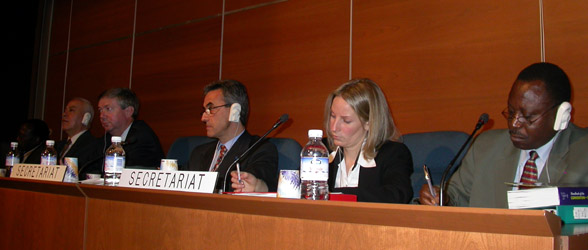
|
|
|
Above photo L-R: ABS opening plenary dais with Nehemiah Rotich,
UNEP, Hamdallah Zedan, CBD Executive Secretary, Hans
Hoogeveen, CBD
COP President, Olivier Jalbert, CBD Secretariat, and Valerie
Normand, CBD Secretariat and Dan Ogolla, CBD Secretariat.
|
|
|
|
Reports:
|
|
|
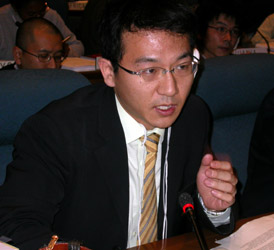 |
|
Japan
highlighted its bioindustry's capacity building programmes in
developing countries. Above photo: Takanori Sakamoto
(Japan)
|
|
|
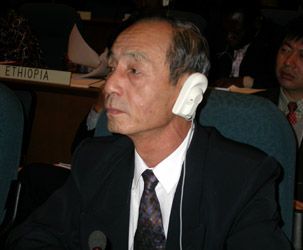 |
|
China
said that developing countries needed time to develop national
capacity to implement the Bonn Guidelines and called on all
countries to share experience in this regard. Above photo: Cheng
Weixue (China)
|
|
|
|

|
|
Brazil
underlined the need for an international regime on ABS and noted
that the Bonn Guidelines do not ensure the rights of provider
countries and of indigenous communities. Above photo: Fernando
J. M. Pimenta (Brazil)
|
|
|
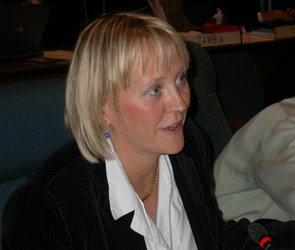
|
|
Norway
announced an upcoming Government decision to update its ABS
legislation. Above photo: Birthe Ivars (Norway)
|
|
|
|
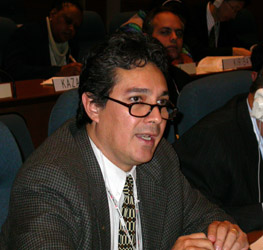 |
|
El
Salvador announced the successful establishment of national
policies and measures for access to genetic resources using the
Bonn Guidelines and highlighted efforts to harmonize these
policies at a regional level through a Central American protocol
on ABS. Above photo: Jorge Ernesto Quezada Diaz (El
Salvador)
|
|
|
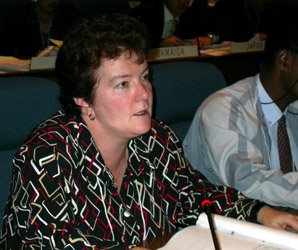
|
|
The
European Community (EC) drew attention to its biodiversity
strategy, legal framework in relation to ABS, and actions at the
community level to harmonize legislation and ensure stakeholder
participation. Above photo: Jill Hanna (EC)
|
|
|
|
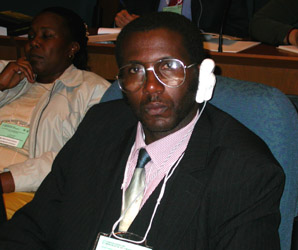
|
UGANDA identified challenges, including lack of capacity,
negotiating different types of benefits, and addressing
non-compliance. Above photo: David Hafashimana (Uganda) |
|
|
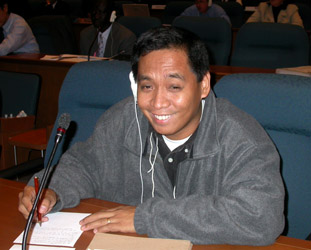
|
|
South East Asia Regional Initiatives for Community Empowerment (SEARICE)
stressed the usefulness of the Bonn Guidelines in establishing the
Framework on ABS of the Association of South East Asian Nations
and called upon delegates to recognize indigenous rights in
developing legislation and managing ABS initiatives. Above photo: Elpidio
Peria (SEARICE)
|
|
|
|
| International
Regime on ABS: |
|
|

|
|
Colombia
suggested recommending that COP-7 recognized that beginning
negotiations on an ABS regime is crucial for the future of the CBD.
|
|
|
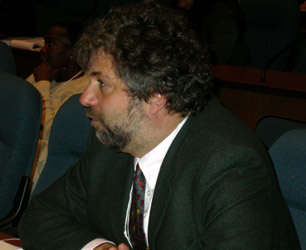
|
|
Switzerland
noted that the international regime for ABS should build on
existing approaches and called for measures enabling industry to
make commitments for ABS. Above photo: François Pythoud
(Switzerland)
|
|
|
|
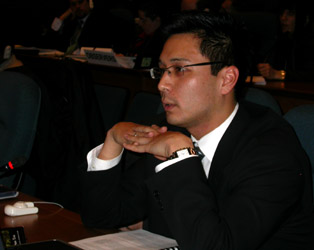 |
|
The International
Indigenous Forum on Biodiversity stressed that: indigenous peoples
hold sovereign rights over their knowledge; indigenous knowledge
is intrinsically linked to biodiversity; human rights and
indigenous customary laws are fundamental to the development of an
international regime; and indigenous consultation must occur at
the national and local levels. Above photo: Merle Alexander
(International Indigenous Forum on Biodiversity)
|
|
|
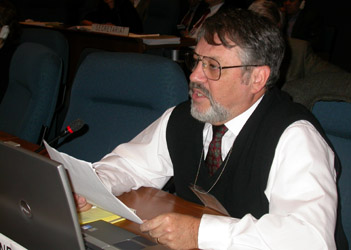 |
|
International
Chamber of Commerce (ICC) cautioned against an international
regime that would discouraged countries from developing national
legal frameworks, and suggested that countries be given more time
to implement the Bonn Guidelines. Above photo: Thomas Jacob
(ICC)
|
|
|
|
ENB ABS-WG2 Snapshots: |
|
|
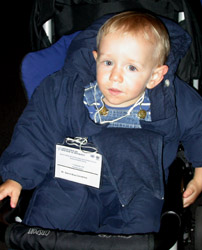 |
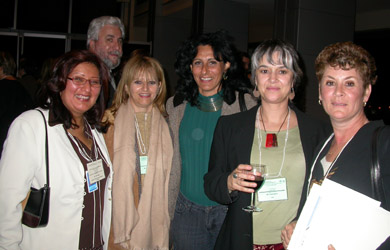
|
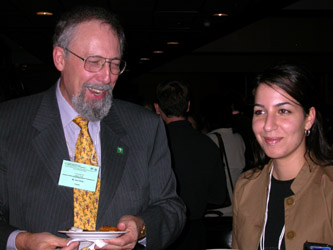 |
|
Above
photo: Gabriel Shaw Cannabrava, could be the youngest observer at
the ABS-WG2 meeting. |
Above
photo: Frida Velarde with delegates from GRULAC |
Above
photo: Delegates from Canada |
|
|
|

|
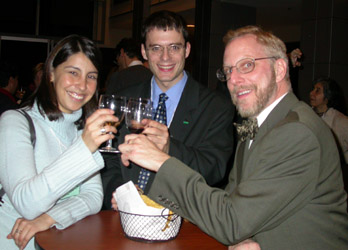
|
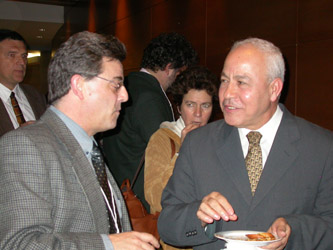
|
| Above photo: Paola
Deda and Leila Ali (CBD Secretariat) |
Above photo L-R: Delegates from
Mexico, NGO, and the US
|
Above photo R-L: Hamdallah Zedan, CBD
in discussion with a spanish delegate
|
|
|
|
|
|
|
|
|
|
|
|
![]()




